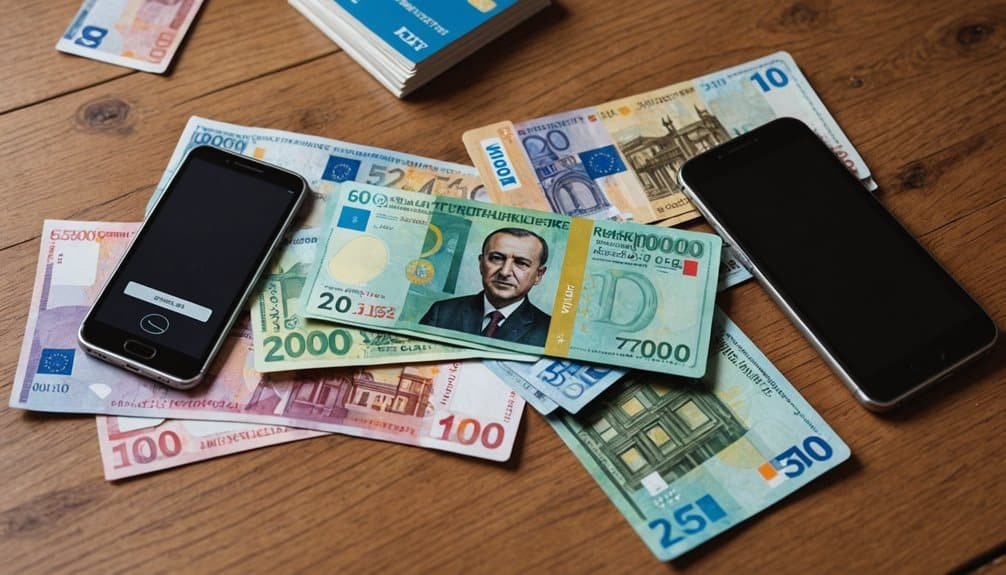
When visiting Turkey, you'll want to navigate its financial landscape smartly. Carry both Turkish Lira (₺) cash and cards, prioritizing bank-affiliated ATMs and authorized exchange locations. Expect to tip 5-15% in restaurants, using local currency discreetly. Urban areas widely accept contactless payments, but small markets prefer cash. Always choose to pay in lira to avoid conversion fees, and use money belts to protect your funds. Notify your bank about travel plans and monitor exchange rates for ideal withdrawals. Stick to reputable financial services, and you'll gain insider insights into Turkey's vibrant economic ecosystem.
Key Takeaways
- Carry both Turkish Lira cash and cards, ensuring flexibility across diverse transaction environments with widespread card acceptance.
- Use bank-affiliated ATMs for safer withdrawals, comparing rates and notifying your bank about international travel to prevent card blockages.
- Tip in local currency, observing cultural norms: 5-10% in casual restaurants and 10-15% in upscale venues, using discreet tipping practices.
- Prioritize official currency exchange locations and authorized institutions to guarantee legal protection and avoid potential fraud or unfavorable rates.
- Consider prepaid currency cards to lock in exchange rates, minimize transaction fees, and provide a secure alternative to carrying excessive cash.
Understanding Turkish Lira
Currency is the lifeblood of any economy, and Turkey's monetary system reflects its rich historical journey. The Turkish Lira, with its unique symbol ₺, emerged in 1923 after the establishment of the Republic of Turkey, replacing the Ottoman lira.
Its currency history showcases remarkable transformations, including a significant redenomination in 2005 that removed six zeros from its value, introducing the New Turkish Lira (TRY). Currency volatility continues to challenge the Turkish economy, with frequent market interventions by the Central Bank to stabilize exchange rates.
The currency symbolism extends beyond mere numerical value, with portraits of Mustafa Kemal Atatürk adorning banknotes and coins. Available in denominations from 5 to 200 lira, and subdivided into kurus, the Turkish Lira represents more than just a medium of exchange—it's an indication of Turkey's economic resilience and national identity.
Understanding its nuances helps travelers navigate financial interactions effectively.
Currency Exchange Essentials
Travelers venturing into Turkey will find maneuvering the local currency exchange landscape both essential and nuanced. Your success hinges on smart currency exchange tips that maximize value and minimize risks.
Compare exchange rates across banks, authorized exchange offices, and online platforms to secure the best deal. Timing matters—aim to exchange during weekday banking hours when rates are most favorable.
Prioritize official exchange locations like banks and authorized bureaus, steering clear of unauthorized street vendors. ATMs offer convenient alternatives, but watch for potential foreign transaction fees. Turkish law no. 1567 strictly regulates currency exchange, mandating transactions only through authorized financial institutions to protect travelers from potential legal complications.
Always count your Turkish lira carefully and verify the exchanged amount. By staying vigilant and strategic with exchange rate comparison, you'll navigate Turkey's financial terrain confidently, ensuring your travel funds stretch further.
Payment Methods and Tips

You'll want to navigate Turkey's payment landscape strategically, balancing cash and card usage depending on your location and transaction type. ATMs are widely accessible, allowing travelers to withdraw local currency with ease.
While over 50% of transactions use payment cards in urban areas, you'll still need cash for local markets, small eateries, and tipping.
Understanding this dual payment ecosystem will help you manage your money smoothly and avoid unnecessary complications during your travels.
Cash or Cards?
When maneuvering payment methods in Turkey, visitors will find a dynamic blend of cash and card transactions. Your cash preferences will shine in local markets, small eateries, and street food scenes, where around 30% of payments remain cash-based. Credit card transactions in Turkey have been steadily increasing from 2012 to 2022, reflecting a growing trend in electronic payment adoption.
However, don't rely solely on cash—over 50% of transactions utilize payment cards, especially in urban areas.
Consider these payment strategies:
- Carry both cash and cards to navigate diverse transaction environments
- Use contactless payments when possible, with a 250 lira per-transaction limit
- Keep smaller denomination bills for tips and small purchases
Card limitations exist, with Visa and Mastercard widely accepted, while American Express encounters more restrictions.
Always have a backup payment method to guarantee smooth financial interactions during your Turkish adventure.
Smart Money Strategies
Three key strategies can transform your financial experience in Turkey: mastering local payment methods, understanding currency dynamics, and maneuvering transaction nuances.
Focus on budgeting techniques by tracking exchange rates and planning for various expenses like accommodation, meals, and entry fees. Prioritize using Visa or Mastercard, which dominate nearly 96% of transactions, and leverage travel cards from providers like Wise for low-fee international services.
Minimize currency conversion fees by withdrawing cash strategically—little and often—and using ATMs that offer favorable rates. Carry Turkish Lira for local markets and small purchases, where cash and bargaining reign supreme. Digital wallets are rapidly emerging as a convenient payment alternative, accounting for approximately 11% of online transactions and offering enhanced security features.
Always keep some foreign currency as a backup, but remember that local merchants prefer lira. Stay informed, flexible, and prepared to navigate Turkey's diverse financial landscape.
Navigating Tipping Culture
Turkey's tipping culture represents a nuanced social practice that travelers should understand before exploring the country's vibrant hospitality landscape.
Tipping etiquette reflects cultural significance beyond mere monetary exchange, serving as a gesture of appreciation and respect. Supplemental wages play a crucial role in Turkey's service industry, making tips economically meaningful for workers.
3 Key Tipping Insights:
- Use Turkish Lira when tipping, avoiding foreign coins.
- Expect 5-10% tips in casual restaurants, 10-15% in upscale establishments.
- Tip service workers discreetly using provided tip boxes or wallets.
Service workers anticipate modest gratuities across various sectors.
Restaurant servers, bartenders, hotel staff, taxi drivers, and tour guides all appreciate tips that acknowledge their effort.
While not legally mandatory, tipping is a social norm that demonstrates cultural understanding.
The term "bahşiş" encapsulates this practice, emphasizing mutual respect between service providers and customers.
Money Safety Strategies

While traveling can be exciting, protecting your money requires strategic planning and vigilance. Money security starts with smart choices about cash and card management. Use money belts or RFID-blocking wallets to prevent theft, and always be aware of your surroundings, especially in crowded tourist areas.
Minimize risks by keeping valuables secure in hotel safes and avoiding public displays of cash. When using ATMs, stick to bank-affiliated machines and be cautious of potential skimming scams. Consider carrying multiple payment methods, as the Turkish lira's volatility can impact financial flexibility.
Notify your bank about travel plans to prevent card blockages, and opt for chip-and-PIN cards for enhanced transaction security.
Exchange currency at reputable locations, comparing rates to get the best value. By implementing these theft prevention strategies, you'll safeguard your finances and enjoy a worry-free Turkish adventure.
Smart Spending Abroad
- Use digital wallets like Apple Pay for convenient, secure transactions across 80+ countries. Mobile payment technologies have revolutionized financial transactions in many international destinations.
- Select credit cards without foreign transaction fees to reduce unnecessary expenses.
- Leverage prepaid currency cards to lock in exchange rates and control spending.
Always pay in local currency to avoid dynamic currency conversion fees.
Withdraw larger amounts from ATMs to minimize transaction costs, and strategically choose bank-affiliated machines.
Conclusion
Your Turkish money journey is like steering through a vibrant bazaar – full of potential and excitement. By mastering local currency dynamics, exchange strategies, and financial savvy, you'll transform from a cautious traveler to a confident explorer. Armed with practical knowledge about payments, tipping, and safety, you'll reveal Turkey's economic landscape, ensuring your adventure is as smooth as silk and as rich as Turkish coffee.







Interesting read! But wouldnt it be more useful to have a section on how haggling is part of the Turkish culture, especially in local markets? Just a suggestion!
Interesting read, but I wonder about the locals perspective. Do they prefer cash or card payments from tourists? And how do they handle the fluctuation with the Turkish Lira?
Has anyone noticed fluctuations in exchange rates during their visit? How does it impact budgeting for the trip?
Interesting read but how reliable are the currency exchange rates at local Turkish banks versus airport kiosks? Any experiences to share?
Interesting guide, but is it really necessary to carry cash when most places accept card payments now? Just wondering.
Anyone else think the article could have included more on digital payment methods? Seems crucial in this tech era.
Did anyone else notice the lack of info on credit card usage fees? Quite essential for visitors, isnt it?